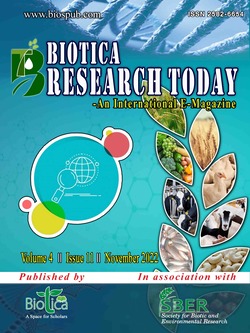
Lipid Peroxidation: Its Mechanism and Significance
Deepak Rao*
Division of Seed Science and technology, Indian Agriculture Research Institute, New Delhi, Delhi (110 012), India
Ashwini Vijal Sakpal
Division of Seed Science and technology, Indian Agriculture Research Institute, New Delhi, Delhi (110 012), India
Ravish Choudhary
Division of Seed Science and technology, Indian Agriculture Research Institute, New Delhi, Delhi (110 012), India
DOI: NIL
Keywords: Antioxidant, Chain termination, Lipid peroxidation, PUFA
Abstract
Lipid peroxidation is one of the primary methods for the degradation of important agricultural, industrial, food, and chemical industry products. This results in product degradation that lowers the quality and quantity of seed production, which has a direct impact on the farmer's output. Initiation, propagation, and termination are the three main phases of lipid peroxiation. In the presence of hydroxyl ions, the double-bonded polyunsaturated lipid (PUFA) reacts to create an unstable lipid molecule. When this unstable lipid molecule interacts with oxygen to form a lipid peroxyl radical, the seed membrane is severely damaged and the integrity of the membrane is compromised. Only chain breaking and termination of lipid molecules can stop the continuous process of lipid peroxidation. Antioxidants that are good for you, such CAT, POX, SOD, and MDA, aid in breaking chain termination.
Downloads
not found
Reference
Anonymous, 2022. Lipid peroxidation. In: Wikipedia, The Free Encyclopedia. Retrieved from: https://en.wikipedia.org/w/index.php?title=Lipid_peroxidation&oldid=1084779671. Accessed on: September 1, 2022.
Gaschler, M.M., Stockwell, B.R., 2017. Lipid peroxidation in cell death. Biochemical and Biophysical Research Communications 482(3), 419-425.
Halliwell, B., Chirico, S., 1993. Lipid peroxidation: its mechanism, measurement, and significance. The American Journal of Clinical Nutrition 57(5), 715S-725S.
Niki, E., 2009. Lipid peroxidation: Physiological levels and dual biological effects. Free Radical Biology and Medicine 47(5), 469-484.
